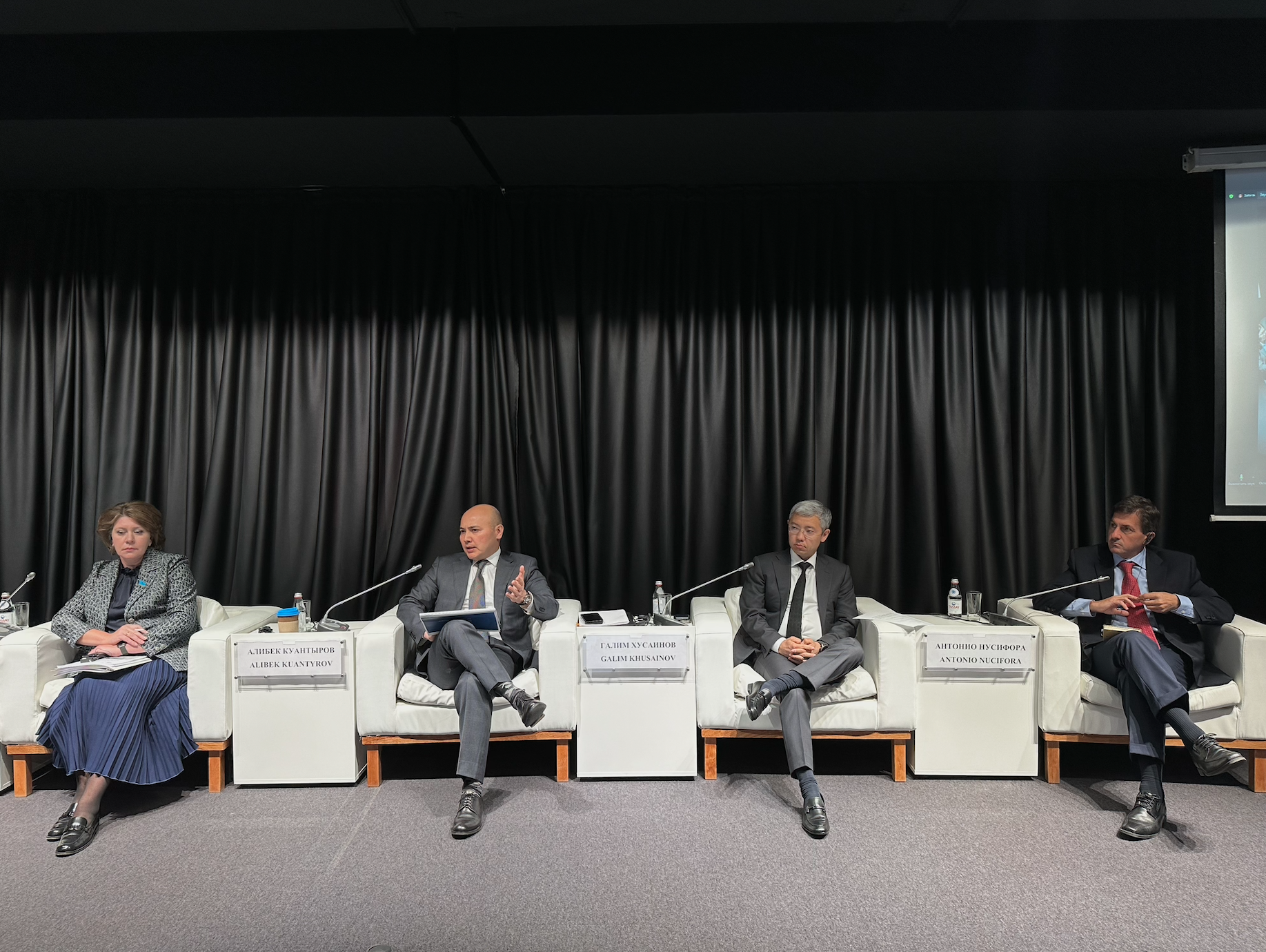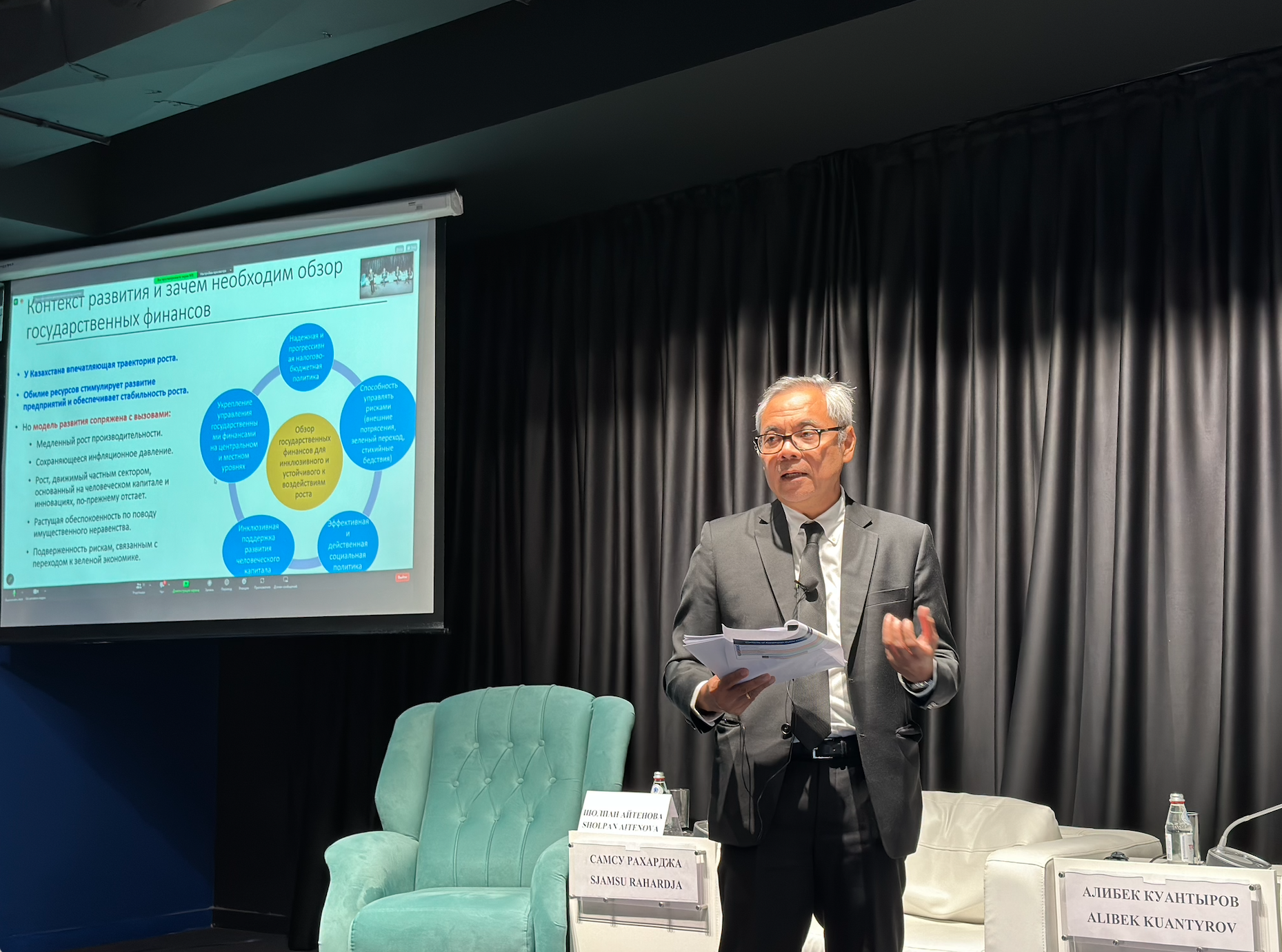ASTANA – The World Bank commended Kazakhstan’s progress in improving budget transparency and ensuring social protection, as well as covered complications in quasi-fiscal activities and revenue collection during the presentation of the Kazakhstan Public Finance Review 2023 at the Economic Research Institute in Astana on Sept. 28.

From L to R: Tatyana Savelyeva, Alibek Kuantyrov, Galim Khussainov, and Antonio Nucifora. Photo credit: The Astana Times.
The event featured a panel discussion on the need for strengthening public finance for inclusive education, better targeted social policies, and the development of intergovernmental fiscal relations. It was moderated by Sholpan Aitenova, the head of the Zertteu Research Institute, the dialogue platform for transparent and accountable budget management and public participation.
In his welcoming remarks, World Bank Country Manager for Kazakhstan Andrey Mikhnev said the organization is “committed to supporting Kazakhstan, its shareholder, in achieving its aspirations to become an advanced and prosperous country.”
Public finance management, according to Mikhnev, represents a key pillar for the government in ensuring economic growth and stabilizing it during the crisis.
In his opinion, oil is the main driver of future growth. “Kazakhstan needs to use the resources wisely and efficiently,” he noted.
Mikhnev also stressed the need to “address concerns over growing wealth inequality, as people with more wealth should pay more taxes and the social protection system needs to be more efficient.”
The review, which was presented by Sjamsu Rahardja, the organization’s senior economist, outlined the key findings in fiscal policy, quasi-fiscal footprint, revenue policy and mobilization, education spending, social protection, budgeting and planning, and intergovernmental fiscal relations.
Fiscal policy
“Kazakhstan has had an impressive growth trajectory since its independence in 1991. The country managed to achieve an upper middle-income status in less than two decades,” said Rahardja.

World Bank Senior Economist Sjamsu Rahardja. Photo credit: The Astana Times.
It appears that the country’s fiscal framework responds better to crisis situations but does not prove its full efficiency during periods of stability.
Rahardja highly appreciated the Kazakh government’s decision to include the cap on expenditure growth, as it is easy to implement and monitor. “Many European states and Organization for Economic Cooperation and Development (OECD) countries use this tool. It is a good addition to the non-oil deficit target,” he said.
The report argues that it is necessary to include quasi-fiscal activities as part of the fiscal framework, improve its accountability, and reform the use of public funds for bank bailouts. The macro-fiscal management needs consistent implementation and independent assessment of fiscal policy performance.
“Under extreme scenarios, we know the government needs to spend money to stabilize the economy. But at the same time, the transfer from the National Fund is restricted, so there is an option for the government to choose whether to borrow money or to liquidate some of the assets. Having an escape clause would also provide the public with a clear and transparent framework,” he said.
Revenue performance
Providing statistics on low progressivity in revenue performance, he noted that the buoyancy of Kazakhstan’s total tax revenue is now at a rate below unity (0.74).

Sholpan Aitenova. Photo credit: The Astana Times.
He underlined that the direct tax in Kazakhstan is among the least progressive.
According to Rahardja, most tax collections in Kazakhstan do not keep up with the gross domestic product (GDP) growth, the value-added tax (VAT) productivity is lagging, and more can be done to reduce the revenue shortfall.
Public spending on education
“In turn, Kazakhstan’s public spending on education demonstrated a sharp increase. This is a welcome development, as the field is extremely important. However, the system created a huge pool of low performers with a small pool of high performers,” said Rahardja.
The statistics showed that while most students in mainstream schools can be described as functionally illiterate, students at elite public schools perform better compared to those from the OECD countries on average. Students at elite public schools disproportionately are from well-off families.
The review suggests that improved results in education will not come only by raising teachers’ salaries.
“Teachers’ remuneration system incentives in teaching hours encourages them to spend more time on teaching but not necessarily on developing the teaching materials, and especially not on supporting students that are lagging. Lastly, the wide variation of students-teacher ratio should be optimized – the redeployment of teachers is needed,” he said.
Social protection
Social protection, according to the review, is among the largest components of the total government budget. It has grown from 4.9% of GDP in 2006-2009 to 5.5% by 2018-2021. Targeted social assistance (TSA) has the best performance, as it benefits socially vulnerable groups the most.
“There are also active labor market programs, which we consider interesting because they provide grants and microloans within the entrepreneurship programs,” said Rahardja.
When asked whether the World Bank’s recommendations are reflected in government reforms, Kazakh Minister of National Economy Alibek Kuantyrov said that “all reforms are mostly related to the economy’s real sector, and it is better to save money for the opening of production facilities and the development of investment projects even though this contradicts the market economy.”
“The reforms towards budgetary and macroeconomic stability, for example, also include the modernization of housing and communal services by changing tariffs. We now need to look at these issues comprehensively, because we have a good reserve for attracting additional loans on favorable terms, considering the funds of the National Fund, our own oil revenues, and expanding the tax base,” said Kuantyrov.
As part of the discussion, Tatyana Savelyeva, the secretary of the finance and budget committee of the Mazhilis, a lower house of the Kazakh Parliament, addressed the development of legislation towards improving the efficiency of public finances.
“We are now considering the budget that has been submitted to the parliament for the next three years. Indeed, there are serious questions about balancing risks. Everyone already understands that a new budget code is necessary. We have very high expectations. We will start working with it soon and will also invite experts,” she said.
Galim Khussainov, the independent director of the Bereke Bank and Damu Entrepreneurship Development Fund, highlighted the two major problems in Kazakhstan’s fiscal policy.
The first one is the stimulation of demand without supply, which leads to an increase in inflation and imports. “It is necessary to stimulate production,” he said.
The second problem, in his opinion, is a decrease in the share of tax revenues to GDP.
“This suggests that the tax burden on business is reduced by constantly creating benefits for the sector. From the point of view of stimulating business, this may be good, but we see that it does not work for the better. Changing the tax policy and the new tax code is absolutely the right decision. We need to completely change the tax structure and bring it in line with the standard of the OECD countries. It is necessary to raise the VAT, no matter how painful it may seem, and to introduce a progressive taxation system for income taxes,” said Khussainov.
World Bank Practice Manager for Macroeconomics, Trade and Investment for Europe and Central Asia Antonio Nucifora mentioned that the role of fiscal policy determines, to a large extent, the country’s overall development.
“The Kazakh government has approximately 20-25% of the resources of the wealth produced by the country in terms of stimulating growth or providing services in the healthcare system and education. We have seen what happened in Greece or Argentina – this happens to the countries that did not manage their finances carefully. Nevertheless, there are countries that have been optimizing the use of fiscal policy, investing strategically without creating imbalances, for example, in supporting research and education. Germany is a very good example,” said Nucifora.
“It is not about the level of spending, it is about its quality,” he noted.

